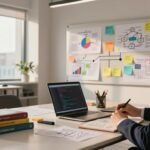
AI Tools are reshaping online businesses in 2025, driving higher productivity, automation, and smarter digital marketing strategies worldwide.
table of contents
AI Tools and the New Era of Online Business
The rise of AI tools has revolutionized how digital businesses operate, from small startups to global enterprises. What used to take hours or even days can now be accomplished in minutes — thanks to automation, predictive analytics, and generative intelligence.
In 2025, companies are no longer asking “Should we use AI?” but rather “How can we maximize its potential?”
Artificial intelligence is no longer just a trend — it has become the engine of online profitability.
1. Automating Repetitive Tasks for Greater Efficiency
One of the most significant advantages of AI tools is automation. Platforms like ChatGPT, Jasper, and Notion AI have streamlined content creation, customer service, and email marketing.
Instead of manually handling hundreds of tasks daily, businesses now rely on AI-powered workflows that operate 24/7 — responding to customer inquiries, managing data, and even optimizing ad campaigns in real time.
This not only reduces operational costs but also allows teams to focus on creative and strategic growth.
2. Smarter Marketing Through Predictive Intelligence
Digital marketing has evolved beyond intuition. With AI-driven analytics, marketers can predict customer behavior, analyze engagement, and create campaigns that convert.
Tools like HubSpot AI, Google Performance Max, and Meta Advantage+ leverage machine learning to refine ad delivery, ensuring every dollar spent reaches the right audience.
In 2025, businesses that integrate predictive AI marketing are seeing up to 40% higher ROI compared to traditional approaches.
3. Personalized Customer Experience at Scale
AI tools have unlocked the ability to personalize every user’s journey.
From recommendation engines on e-commerce sites to AI chatbots that remember customer preferences, personalization is now the key to retention.
Companies like Amazon, Netflix, and Spotify set the global standard — but small businesses are catching up fast through affordable AI integrations like ManyChat, Drift, and Tidio.
The result: stronger engagement, longer customer lifecycles, and higher revenue per user.
4. AI Tools in Content Creation and SEO
In the content economy, AI tools are redefining how blogs, videos, and social posts are produced.
Creators and publishers on platforms like Feenanoor, Medium, and Substack use AI to optimize keywords, analyze trends, and create SEO-rich articles that attract international traffic.
Advanced AI systems like SurferSEO, Writesonic, and Frase can analyze thousands of ranking pages to determine what kind of content performs best in specific regions, helping websites gain authority and increase AdSense RPM in high-CPC countries.
5. Data-Driven Decision Making and AI Insights
AI-powered analytics dashboards are giving business owners unprecedented clarity.
From user heatmaps to revenue predictions, tools like Tableau AI, Google Analytics 5 (GA4), and Power BI Copilot enable companies to make decisions based on real-time intelligence rather than outdated reports.
This data-centric mindset ensures that every marketing campaign, landing page, and SEO effort aligns with measurable outcomes.
6. The Future: AI Agents and Fully Autonomous Systems
The next wave of AI evolution is already here — autonomous agents that handle complete workflows independently.
Imagine an AI system that creates a blog post, designs visuals, schedules social media updates, monitors performance, and optimizes ads — all without human input.
Startups like Perplexity AI, AgentGPT, and OpenDevin are pioneering this revolution, marking the beginning of AI-managed online enterprises.
Within the next few years, fully automated online businesses may become as common as e-commerce stores today.
Read Also :
How to Use Google Search Console to Improve Your Website Performance
How Google Discover Chooses Winners: The Real Rules Behind Trend Exposure
Why Businesses Must Embrace AI Tools Now
Ignoring AI today is like ignoring the internet in the early 2000s.
Businesses that resist automation and machine learning risk falling behind competitors who scale faster, spend less, and earn more.
From marketing to management, every part of an organization can benefit from AI — provided the tools are chosen wisely and integrated strategically.
For example:
- Writers and publishers can use ChatGPT or Jasper to scale content output.
- Marketers can automate audience targeting with Google Ads’ Smart Bidding.
- Entrepreneurs can forecast profits and automate workflows with Notion AI and Zapier.
When used properly, AI tools are not just assistants — they are growth engines.
The transformation of online businesses through AI tools is not just a phase — it’s the foundation of the new digital economy.
Those who invest early in learning, integrating, and optimizing these tools will lead the next generation of successful online ventures.
In 2025 and beyond, AI will no longer be optional — it will be essential.
FAQ
1. What are the best AI tools for online business owners in 2025?
Top-performing tools include ChatGPT, Jasper, SurferSEO, HubSpot AI, Notion AI, and Zapier for automation and content optimization.
2. How can AI tools increase website earnings?
By improving SEO, automating ad targeting, and increasing user engagement, AI tools boost RPM and CPC performance across traffic sources.
3. Are AI tools expensive for small businesses?
Not necessarily. Many platforms offer free tiers or affordable monthly plans starting as low as $10, making AI accessible for startups and individual creators.
4. Can AI completely replace human employees?
Not yet — but AI enhances productivity by automating repetitive tasks, allowing humans to focus on creativity and strategy.
Discover more from Feenanoor
Subscribe to get the latest posts sent to your email.










